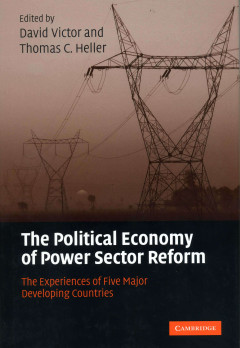Ditapis dengan
Ditemukan 3 dari pencarian Anda melalui kata kunci: subject="Brasil"

The Political Economy of Power Sector Reform
Over the last fifteen years the world’s largest developing countries have initiated market reforms in their electric power sectors, from generation to distribution. This book evaluates the experiences of five of those countries – Brazil, China, India, Mexico and South Africa – as they have shifted from state-dominated systems to schemes allowing for a larger private sector role.
- Edisi
- -
- ISBN/ISSN
- 0-521-86502-6
- Deskripsi Fisik
- xviii, 330 hal.; 23 cm
- Judul Seri
- -
- No. Panggil
- -

Brazil
This edition of Brazil, analyzing as it does many sides of Brazilian life and work, shows that the country is passing through a dynamic phase of renewal, and will emerge unscathed from the international crisis brought about by the rise in oil prices, thanks to the great national effort exerted in 1975.
- Edisi
- -
- ISBN/ISSN
- -
- Deskripsi Fisik
- xxxvi,637 hal. ; 18 cm.
- Judul Seri
- -
- No. Panggil
- 981 BRA

Chica da silva: a brazilian slave of the eighteenth century
- Edisi
- -
- ISBN/ISSN
- 9780521711555
- Deskripsi Fisik
- xxv, 322 hal. ; 23 cm.
- Judul Seri
- -
- No. Panggil
- 306.362092 FUR c
- Edisi
- -
- ISBN/ISSN
- 9780521711555
- Deskripsi Fisik
- xxv, 322 hal. ; 23 cm.
- Judul Seri
- -
- No. Panggil
- 306.362092 FUR c
 Karya Umum
Karya Umum  Filsafat
Filsafat  Agama
Agama  Ilmu-ilmu Sosial
Ilmu-ilmu Sosial  Bahasa
Bahasa  Ilmu-ilmu Murni
Ilmu-ilmu Murni  Ilmu-ilmu Terapan
Ilmu-ilmu Terapan  Kesenian, Hiburan, dan Olahraga
Kesenian, Hiburan, dan Olahraga  Kesusastraan
Kesusastraan  Geografi dan Sejarah
Geografi dan Sejarah